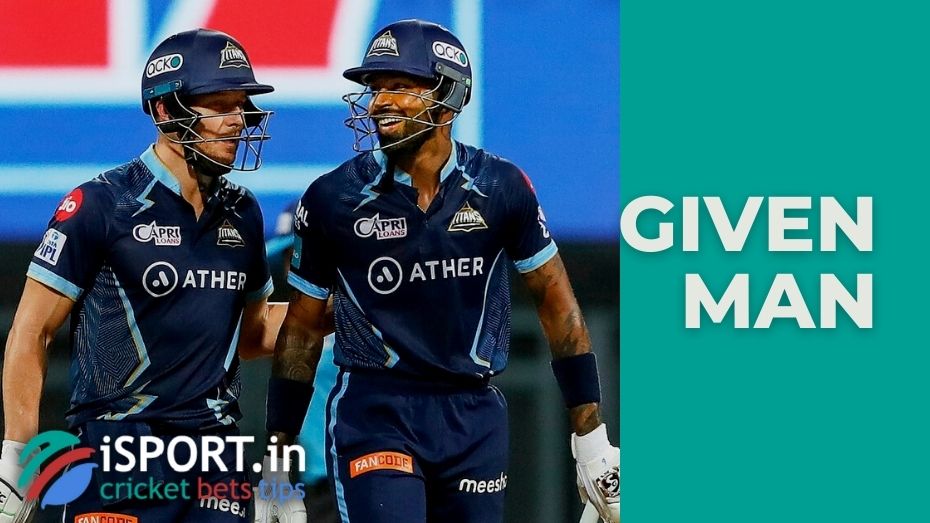Given man

Today, the phrase given man in cricket is almost never used in cricket. For the purpose of making the match less predictable and encouraging spectators to wager actively, this indicates that an experienced player has temporarily joined a side that is not as strong. It is normally “borrowed” from visitors as a general rule. Although it was a regular practice in the 19th century and the early half of the 20th century, particularly within the context of the Gentlemen V Players tournaments, this is something that is relatively uncommon in today’s world.
Given Man in Cricket: History
The novelty of these games was that the players were plainly not on an equal footing with one another. For instance, the teams of Gentlemen were composed of amateurs, while the Players were comprised of exclusively professionals. 1806 was the year that saw the first matches played, and after a little pause, they started being played on a regular basis. Between the years 1819 and 1962, the Gentlemen vs Players series was one of the most popular first-class cricket competitions.
It is important to note that the Gentlemen vs the Players had their own class foundations. The players were the majority of the workers and were paid for their performances, whilst the Gentlemen, who were members of the middle class and aristocrats, played cricket for the express purpose of enjoyment. And despite the fact that the Marylebone Cricket Club was able to standardize the laws of the game and make a clear distinction between professionals and amateurs, the latter group often collected a much higher amount of money due to the fact that there was almost no control over the extra charges.
On the other hand, at the beginning, the Gentlemen were often defeated, which had the potential to have an impact on the popularity of the series. There have been a few efforts made to equalize the players on the field, such as putting wickets of varying sizes, but none of these endeavors have been very successful. As a result of the implementation of the Given man rule, matches became less predictable, which in turn encouraged spectators to line up in the stands.
Given Man in Cricket: Gentlemen vs the Players
The matches between Gentlemen and Players were contested over the course of three days. Many times, Lord’s, The Oval, and Scarborough are the ones that host the event. It was the location of the last commemorative game in the series, which took place in 1962, and it was specific to the last. The Given man rule was the reason why the Gentlemen were able to win the opening match of the series, which took place in July of 1806. This is an important fact to keep in mind.
They won by a score of 14 runs, despite the fact that they “borrowed” Billy Beldham and William Lambert. The contribution that Lambert made to the end outcome was so highly valued that the Gentlemen found a means to entice him away from the project. And although though the side had its stars, such as Lord Frederick Bocklercq, the fact that this talented batter was playing contributed to an increase in interest in the series as a whole.
The matches resumed after a halt that ended with the conclusion of the Napoleonic Wars. Nevertheless, the fifth match in a row, which was scheduled to coincide with the crowning of the unpopular George IV, sparked justifiable concerns. Due to the fact that they had a head start at the beginning of the game, the Gentlemen essentially let their hands drop and enabled the Players to gain an edge, eventually giving up in a peaceful manner on the second day.
The fact that the losers had sufficient resources to secure a successful outcome was the root cause of public displeasure. It was exactly because of the extended bench that the Gentlemen were able to win more often over the first several decades of the series. It wasn’t until the 1940s that things started to shift, precisely when the success rate of amateurs started to steadily decrease.
The slow decline of the Gentlemen versus Players competition, which would continue with varied degrees of success for many decades, was brought about by the increasing popularity of test cricket as well as the success of rival series (for example, North vs South). In the first place, the social class structure itself underwent a transformation, and in the second place, the rules that were previously thought to be unchangeable started to undergo revisions. As a result of the decision taken by the MCC in 1963 to eliminate the status of amateur cricket, all first-class players were immediately elevated to the level of professionals.
Additionally, the Gentlemen vs Players, which were subsequently replaced by one-day games, were rendered obsolete. In the beginning, the MCC was still contemplating the potential of restarting the series with its following reform; but, in the end, it was determined that the series would be refocused on the new Gillette Cup championship. There was a widespread disagreement among the general public about this matter, with some traditionalists lamenting the “end of an era.” At the same time, a number of cricket players, most notably Fred Trueman, expressed their satisfaction with the ending of the Gentlemen vs. Players competition, which they considered to be a “useless anachronism.”
From 1806 to 1962, 274 matches were played, 125 of which were won by the Players, and another eighty ended in a draw.
It is interesting: one of the most famous and popular Given man in cricket history was William Gilbert Grace. He simultaneously played for the Gentlemen of the South and the Players of the South in the summer of 1865. His transition to the camp of Gentlemen allowed the latter to noticeably increase the level of their game and ultimately defeat a more skilled opponent.
You can bet on your favorite team with 4rabet promo code.
